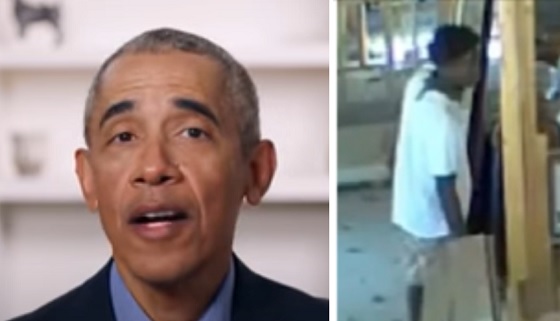As the focus slowly shifts to former President Obama and his role in the shady effort to target President Trump’s campaign and his administration once elected, Obama’s voice is suddenly being heard a little more often.
A voice that not only endeavors to criticize his successor, but also moves to inflame racial tensions in the country.
“More than anything, this pandemic has fully, finally torn back the curtain on the idea that so many of the folks in charge know what they’re doing,” the former president said Saturday, of the Trump administration’s handling of the coronavirus outbreak.
And while Obama did not mention Trump by name, he suggested that the president thinks like “a kid,” and that this is “why things are so screwed up.”
“Do what you think is right,” he told the graduates. “Doing what feels good, what’s convenient, what’s easy — that’s how little kids think. Unfortunately, a lot of so-called grown-ups, including some with fancy titles and important jobs, still think that way — which is why things are so screwed up.”
The remarks came during a speech to high school graduates that was broadcast by the major television networks, and a streamed speech for graduates of 74 historically black colleges and universities, the Washington Post reported.
After spending time traveling the world on lavish getaways, Obama is engaging more in the lead up to the 2020 election — his vice president, Joe Biden, is the presumptive Democratic nominee. For now, anyway.
On an alleged “leaked” call last week to some of his former administration officials, Obama was critical of Trump’s response to the COVID-19 pandemic, calling the effort “an absolute chaotic disaster.”
“This election that’s coming up on every level is so important because what we’re going to be battling is not just a particular individual or a political party,” Obama also said on the teleconference. “What we’re fighting against is these long-term trends in which being selfish, being tribal, being divided and seeing others as an enemy — that has become a stronger impulse in American life.”
But Obama’s words regarding the Ahmaud Arbery shooting were more egregious, as he held the incident up as an example of racial injustice.
This from the man who set race relations in America back 50 years while in office, an effort that began early on, when he said six months into his first term that police had “acted stupidly” in arresting a belligerent black Harvard professor, who Obama called a friend.
Racial animosity went downhill from there, culminating with the fiasco in Ferguson, Mo., where a white police officer’s life was destroyed when he defended himself from a violent attack by 18-year-old Michael Brown, who outweighed him by nearly 100 pounds.
The “hands up, don’t shoot” narrative swept the country, even though it would later be proven to be a lie, and on Saturday, Obama perpetuated the highly disputed narrative that Arbery was “just a jogger” who was hunted down by two white men.
Obama told graduates, “You’re being asked to find your way in a world in the middle of a devastating pandemic and a terrible recession. The timing is not ideal. And let’s be honest: A disease like this just spotlights the underlying inequalities and extra burdens that black communities have historically had to deal with in this country. We see it in the disproportionate impact of COVID-19 on our communities, just as we see it when a black man goes for a jog, and some folks feel like they can stop and question and shoot him if he doesn’t submit to their questioning.”
And again, the same man who admitted he didn’t have “all the facts” when he spouted off against police in 2009, declared the shooting to be a racially driven injustice — early indications suggest that Arbery was a burglary suspect who was seen entering a property under construction.
“Injustice like this isn’t new,” Obama declared. “What is new is that so much of your generation has woken up to the fact that the status quo needs fixing; that the old ways of doing things don’t work; that it doesn’t matter how much money you make if everyone around you is hungry and sick; that our society, and our democracy, only works when we think not just about ourselves, but about each other.”











